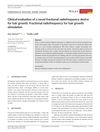 March 2024 in “Journal of functional foods”
March 2024 in “Journal of functional foods” Collagen peptides from marine and bovine sources may help prevent hair loss by affecting hair follicle stem cells differently.
March 2023 in “Pakistan Journal of Medical and Health Sciences” Low vitamin D levels are linked to higher rates of hair loss in women.
 January 2023 in “The Egyptian Journal of Hospital Medicine”
January 2023 in “The Egyptian Journal of Hospital Medicine” Topical Valproic acid and 5% Minoxidil both significantly increase hair count in Female Pattern Hair Loss, with similar side effects.
Natural products may help treat hair loss by promoting hair growth with fewer side effects.
July 2022 in “Dermatologica Sinica” Many women with hair loss also have zinc deficiency, iron depletion, or thyroid issues.
January 2022 in “Journal of Ayurveda case reports” Ayurvedic treatment significantly reduced hair loss and improved hair quality in a 30-year-old male.
December 2021 in “Egyptian Journal of Dermatology and Venereology” Oxidative stress may worsen female pattern hair loss and could help track the disease and treatment.
September 2021 in “Journal of advances in medicine and medical research” Low Vitamin D levels are linked to female hair loss.
 April 2021 in “Journal of The European Academy of Dermatology and Venereology”
April 2021 in “Journal of The European Academy of Dermatology and Venereology” Age, hair loss duration, menopause, and specific treatments affect hair density and caliber in female hair loss patients.
January 2021 in “Menoufia Medical Journal” Women with pattern hair loss often have higher blood sugar, cholesterol, blood pressure, and waist size, suggesting a link between hair loss and metabolic syndrome.
March 2023 in “Anais Brasileiros De Dermatologia” Topical minoxidil is the best-supported treatment for female hair loss, but personalized plans are needed.
 January 2022 in “Clinical Cases in Dermatology”
January 2022 in “Clinical Cases in Dermatology” A condition called Central Centrifugal Cicatricial Alopecia causes hair loss and scalp burning in middle-aged African women, and it's treated with various medications, hair transplants, and non-drug methods like wigs.
 81 citations,
July 2011 in “Lasers in Medical Science”
81 citations,
July 2011 in “Lasers in Medical Science” The Lexington LaserComb helped regrow hair in mice with a condition similar to human hair loss.
 59 citations,
March 2020 in “Journal of Biomedical Science”
59 citations,
March 2020 in “Journal of Biomedical Science” Understanding how hair follicle stem cells work can help find new ways to prevent hair loss and promote hair growth.
 56 citations,
January 2019 in “Skin appendage disorders”
56 citations,
January 2019 in “Skin appendage disorders” The most common hair loss type at specialist clinics is androgenetic alopecia, especially in younger men, followed by alopecia areata and telogen effluvium, with differences seen across regions.
 34 citations,
May 2012 in “International Journal of Molecular Sciences”
34 citations,
May 2012 in “International Journal of Molecular Sciences” Dieckol from Ecklonia cava may help hair growth and could be a potential hair loss treatment.
 27 citations,
June 2013 in “Genes & development”
27 citations,
June 2013 in “Genes & development” Cav1.2 affects hair growth and could be a target for hair loss treatments.
 24 citations,
January 2015 in “Annals of Dermatology”
24 citations,
January 2015 in “Annals of Dermatology” Herbal extracts may help hair grow and could be an alternative to synthetic hair loss treatments.
 20 citations,
April 2016 in “Journal of Cosmetic Dermatology”
20 citations,
April 2016 in “Journal of Cosmetic Dermatology” Methyl vanillate spray increases hair count and hair mass in women with hair loss.
 17 citations,
December 2015 in “BMC Complementary and Alternative Medicine”
17 citations,
December 2015 in “BMC Complementary and Alternative Medicine” A new plant extract from Avicennia marina could potentially be used to treat common hair loss.
 12 citations,
February 2016 in “Biochemical and Biophysical Research Communications”
12 citations,
February 2016 in “Biochemical and Biophysical Research Communications” Sulforaphane may help with hair growth by breaking down a hormone that causes hair loss.
11 citations,
January 2017 in “Journal of research in pharmacy practice” The combination of zinc sulfate and calcium pantothenate effectively controls early-stage hair loss.
 11 citations,
April 2015 in “International Journal of Cosmetic Science”
11 citations,
April 2015 in “International Journal of Cosmetic Science” Adenosine helps grow thicker hair in Japanese men with hair loss.
 9 citations,
January 2018 in “Dermatologic Therapy”
9 citations,
January 2018 in “Dermatologic Therapy” The HairLux device safely and effectively promotes hair growth in people with hair loss.
 8 citations,
September 2017 in “Journal of Natural Medicines”
8 citations,
September 2017 in “Journal of Natural Medicines” Applying an extract from Perilla frutescens helps hair grow and fights the effects of hair loss hormones.
 5 citations,
November 2019 in “Dermatology and therapy”
5 citations,
November 2019 in “Dermatology and therapy” Beard hair extraction improves scalp hair restoration results in East Asian men with severe hair loss.
 5 citations,
September 2016 in “Journal of Cosmetic Dermatology”
5 citations,
September 2016 in “Journal of Cosmetic Dermatology” Nourkrin® with Marilex® may increase hair count by 35.7% in postpartum hair loss.

















